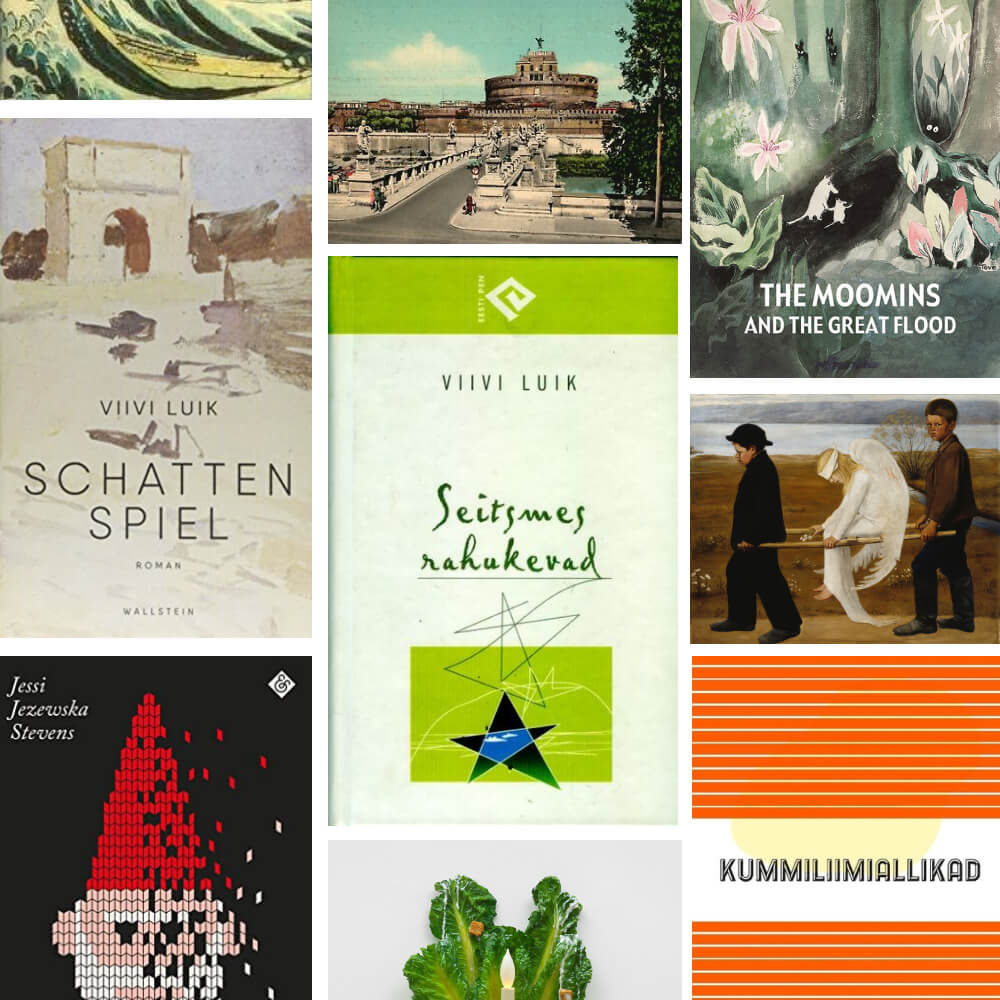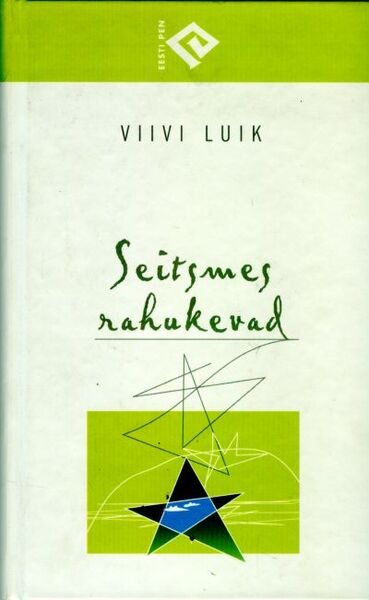June 2022 Reading Recommendations
May 2022 Reading Recommendations
2021 Book Review: Faves & Recommendations

Summer is for wandering around Estonia, reading Estonian authors, and writing for Estonian publications.
The thing with Estonian book prints is that they’re sold out in 1-2 years (occasionally in 1-2 months) and just try getting your bony reader’s fingers on a copy later. Unless you browse your family’s and friends’ bookshelves and unearth the second row of books that reveals hits like Debora Vaarandi’s poetry, Friedebert Tuglas’ travelogue, or “Hingede öö” by Karl Ristikivi.
I’ve been reading Viivi Luik for most of July and her wise, elegant prose is haunting my interpretation of anything I see or hear.
Books read this month:
- “Varjuteater” by Viivi Luik, 5/5
- “Seitsmes rahukevad” by Viivi Luik, 5/5
- “Kummiliimiallikad” by Kiwa, 2/5
- The Visitors by Jessi Jezewska Stevens, 2/5
Best of stories + poetry read this month
- #poem | “What I Like about You, Baby” by Anne Carson
- #story | Golden years by Kaliane Bradley
Book reviews
“Seitsmes rahukevad” by Viivi Luik, 5/5

Seven years after WW2, the times were still tumultuous in Estonia, then part of the Soviet Union. In “Seitsmes rahukevad” (The Seventh Spring of Peace), the Estonian writer Viivi Luik reminisces about her upbringing in the Estonian countryside. The novel is a series of poetic memory images of an imaginative child interpreting and translating the world to herself as she’s left on her own by the grownups busy with tending to the house, fields, and animals.
For people who spent their childhood out of the city, next to fields, forest, and water (or even just spent their childhood summers in the wilderness), there are plenty of moments of recognition. Even for me, born almost 50y after Luik, the overlaying feeling of boredom and the inventiveness that stems from the boredom of a child without a plethora of modern toys to play with, traipsing the garden and forest, making up their own magical dreamworld, was highly relatable and ignited dreamy, nostalgic memories.
The Soviet past is woven in-between the lines lightly, compared to other historicist novels by Estonian writers that tend to be wearying and grim. It’s the perfect book to read in one’s country house on a sunny summer day, possibly in dialogue with Tove Jansson’s recollections of her childhood spent on Finnish islands.
The imagination of a child isn’t limited by wealth and items, it’s a boundless source of entertainment and magic drawn from life and nature.
“Varjuteater” by Viivi Luik, 5/5

In “Varjuteater” (Shadow theatre), Viivi Luik takes the reader on a journey to Rome where she lived with her husband, the ambassador to the Estonian Republic. She describes the black cobalt streets, shining as if covered in grease; the haughty sensibilities and vulnerable pride of Italians; the luxuries that float above the surface while below looms an ocean of poverty and suffering. But in Luik’s eyes, even the most misfortunate of affairs has its own glimmer of beauty.
The book isn’t as much of a travel memoir but a collection of images and wisdom collected on one person’s journeys to Berlin, Rome, New York, Helsinki, Tallinn, and the unknown villages of Estonia. Everything in this world, Luik shows us, is interconnected. From Italy to Estonia, olive trees to apple trees, there’s a mysterious connection that threads together places, events, and times. On rare occasions, two distant memories connect and transform into a complete, circular shape. Like two puzzle pieces that have been waiting to find their second half.
This might as well be the best Estonian book I have read.
“Sa võid oma vanad mõtted veel aastate ja aastakümnetegi pärast üles leida, kui lähed tagasi samasse kohta, kus sa neid mõtlesid. Alles siis, kui need kohad ja paigad on maa pealt kadunud, kaovad ka nendega seotud mõtted. Sel põhjusel hävitataksegi vallutatud maades kõigepealt kõik endine ära, lammutatakse maha ja kujundatakse pmber. Kui pole enam alles mõtlemise paika, pole alles ka mõtet.”
“Südasuvel on õunapuud rohelised. Õunad pole veel värvi võtnud. Mõnikord puhub merelt vali tuul ja lööb õunapuulehed pahupidi. Siis läigatab õunapuulatvades hõbedat nagu oliivipuulatvades. Siis olevat maailm korraga üks tervik. Kera. Ilma alguse ja otsata. Siis olevat oliivipuu ja õunapuu inimesega üks tervik ja nii õlipuu kui ka inimese ainuke ja tõeline ülesanne olevat saada seest tühjaks ja avada oma süda.”
“Varjuteater” also introduced me to the symbolist paintings of the Finnish artist Hugo Simberg.

Essays, reviews, poems:
#Review #Literature | Desperate Characters and the Chaos That Lies Beneath by Sigrid Nunez via The New York Times Book Review, link
The writer Sigrid Nunez writes about her personal connection with the novels of Paula Fox, author of “Desperate Characters.”
“In “Desperate Characters, it is the cat that causes the injury by literally biting the hand that feeds it — the hand of a woman, the novel’s main character, Sophie Bentwood. This incident occurs right at the beginning of the book and, as we read on, we are kept in suspense as to how serious the bite is, whether the cat — a stray — might be rabid and why Sophie, an intelligent and educated woman, would rather deny the problem, even as her hand swells and throbs, than seek medical advice. Another source of suspense has to do with whether or not an extramarital affair she once had will come to light.”
#Review #ClimateWarming | Flaubert’s Planet by Aaron Matz via The New York Review of Books, link
Do novelists, and their readers, bear some responsibility for the climate crisis?
#Review #ClimateWarming | The Forest’s-Eye View by Verlyn Klinkenborgz via The New York Review of Books, link
On the books investigating the ways in which deforestation affects climate change, and how climate change affects forests.
Hasso Krull Õnnepalu “Palgast” – via Vikerkaar, only in the print magazine, link
Õnnepalu’s egocentric poeticizing has always disturbed me. Hasso Krull, another trickster of Estonian literature, seems to share the view. I read bits of the review to my mom while in a taxi and noticed the driver smirking and gradually lowering the sound of a radio show to hear more. A good laugh for Estonian readers.
#Review #Literature #History | Review of Free: Coming of Age at the End of History by Lea Ypi. By Thomas Meaney via The London Review of Books, link
The Irreplaceable by Bee Wilson via The London Review of Books, link
On the palm oil industry and how it took over the world.


